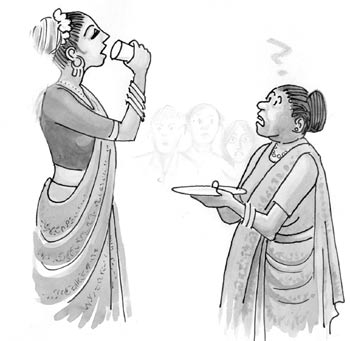
Memories of Sri Lanka
SAVORY: As soon as I walked into the room I was overcome by the savory aromas of curry and coconut. Memories associated with these scents that I have missed during the past six weeks back in my hometown, New York City rushed to the forefront of my mind.
I thought of all of the wonderful meals with lovely friends I had made while in Sri Lanka for nine months. I joined my New York friends who were waiting for me at the Sri Lankan restaurant in the East Village of New York City, Sigiri owned by Tanya De Silva and Mala Rajapakse.
I surveyed the room and saw three other groups already enjoying their meals of rice and curry. I heard murmurs of Sinhala and when I closed my eyes, I felt, just for a moment, that I had never left the beautiful island.
There were four of us at the table, three friends who had visited me and myself in Colombo this past April while I was living and studying there for my post-graduate degree in Sustainable Development. As we waited for our food to arrive, we shared memories of our trip fondly - our travels down the coast to Galle District, then up to Nuwara Eliya and time exploring Colombo.
As the conversation continued, I considered the transition I have made over the past month - all that I had left behind in Sri Lanka and the events in life since my return to New York. After spending time getting to know and love the culture and the people of Sri Lanka, leaving the country was not an easy thing to do.
The last time I wrote my reflections, I was getting ready to leave Sri Lanka with an unknown immediate future - other than finishing the work for my degree while living at home in New York. I had lived abroad several times before in Africa and Europe and each time returning to New York, transitioning from one culture to another was a challenging yet manageable experience.
Yet this time, returning to my native country was more difficult of a transition than ever - I found myself pining for Sri Lanka. Perhaps it was related to having to leave so abruptly.
Instead of staying through the end of December as planned, my university in America required me to leave with only two weeks notice since they were concerned for my safety in Colombo. Several of my American classmates challenged our school's decision and stayed behind - I was proud of them, yet I also wished I could have done the same. There were so many places I had yet to visit and things I had yet to do in Sri Lanka, it did not seem right at the time to have to go, but I knew there was a reason for my return.
I spent the month back in New York, happy to be with my friends and family, yet longing to still be in Sri Lanka. How had the country left such a strong impression on me? To be honest, it took several months for me to get used to the rhythm of Colombo and the village where my homestay was.
In New York, I enjoyed the respect and freedom of being a young woman with the ability to do things on my own without feeling judged. My initial experience in Sri Lanka took a lot of time and energy to adjust to, but once I got familiar with my surroundings, I felt a deep connection and respect for the country, its culture and its people.
When I first arrived in Colombo, I had the impression that being an academic woman in the country on my own to do research was somewhat looked down upon or questioned by Sri Lankans whom I met. Although the fact that I was a student was highly respected, the element of being a young woman on my own was not. I noticed that once I built relationships with people, they respected who I was - as I was also given the opportunity to learn what others' values were and did my best to show mutual respect.
For example, when I first arrived in the home of my host family in Kalutara district, they requested that I not go anywhere by myself. This seemed preposterous to me since my purpose was to conduct research and would require me to do things on my own, frequently.
Yet I understood that their intentions were good - they were only thinking of my safety and how I would be viewed by the rest of the village. After several days of getting to know the family, I slowly did more things on my own, always sure to tell them of my whereabouts.
Fortunately, there were other classmates located nearby in the village - three Americans and one Sri Lankan, so I was sure to make use of their company so my host family felt more comfortable. By the end of the year, a strong bond of trust had developed among all of us - they no longer asked what I did or tried to influence what I should do.
They would let me take the children with me for long walks on the beach or to a field to do yoga. In fact, I shared with them what I did anyway because I knew they trusted me and we loved and cared for one another.
In Colombo, I went through a different experience, which unfolded in three stages. In the first stage I felt very comfortable walking around and doing things on my own in the capital because, I think, I was more or less oblivious to what people were thinking. I ran errands on my own, would go to meet friends on my own without being aware of the looks of disapproval that came my way.
In the second stage, I suddenly felt very aware and self-conscious of what Sri Lankan men and women thought of me - whether it was doing things on my own, what I wore and how I interacted with others.
This stage particularly increased as I was learning more Sinhala and began to hear pieces of peoples' comments around me - wondering where I was from and what I was doing in Sri Lanka. I also recall being alone for the first time after nightfall, and all of the strange looks I received - it was not the experience I was expecting, as this is a respectable thing for a woman to do where I am from. I continued to try to be respectful of the culture, but the difficulty was that I was not fully aware of what the right thing to do was.
Finally, I came to the realisation that while I wanted to respect the various cultures in Sri Lanka, I also needed to be true to my own identity. Further, I recognized that there was no one right way to live life anyway. Just as in anywhere else in the world, there will always be people to criticize and support you. After taking the time to ask questions from trusted friends on what is culturally appropriate, it was apparent that continuing to be genuine was the best approach.
This mentality prompted me to explore Colombo on foot one day, even though I realized that a woman walking alone in Colombo for leisure was unusual and perhaps not respected by some. I heard from a friend the day after going for a Sunday stroll in Colombo - they told me that they saw me walking.
When I asked why they didn't say hello the response was, "well, I was with my parents, and you know...?" Indeed, I did know - their parents would not take well to a young woman walking the streets of Colombo unaccompanied.
I don't wish to make generalizations or say that there is something wrong with all of Sri Lankan mentality. I would only like to point out that I experienced these judgments towards young women to be true in some cases.
Although I did face challenges in getting adjusted to Sri Lanka, I mostly enjoyed the friendliness that was more evident and frequent than the presence of judging and mistreating others.
The genuine interactions amongst people, especially friends, always struck me as a quality to be grateful for during my time in Sri Lanka. My Sri Lankan colleagues and friends were endlessly generous, kind and most of all - accepting.
Although clearly I was an "outsider," it never ceased to amaze me at the welcoming that I experienced in peoples' lives and homes of those I met. For all of the physical beauty of the island, I believe it was the relationships with people that made it particularly hard to leave Sri Lanka.
Although it was disappointing to have to leave last September, there was a hidden blessing for me in having to go home. I was able to spend time with my aging maternal grandmother, "Nana," who had recently become ill.
I even spent the last hours of her life by her side - something I would not have been here to do if I had still been in Sri Lanka, as was the original plan. Other than helping my family care for my "Nana," I spent time working on my thesis, writing papers for my course work, doing yoga and reconnecting with all of the family and friends I had not seen in nearly a year. I explored the streets of my own city as though I was a tourist - as though I was seeing things for the first time.
A gust of cold wind blew into the restaurant to bring me back to the present - the waiter brought the four curries to our table and I immediately felt comforted by the familiarity of the meal. I savored the scrumptious tastes in my mouth with each bite.
The spices were delicious enough to want seconds and thirds - although not exactly as my host mother in Kalutara would make it. The four of us finished all of the food on the table - rice, curries and string hoppers. We couldn't resist sharing desert - Kiri, Watalappam and caramel pudding.
Americans tend to eat rather early, especially on a Monday like this one. By 10pm, we were the last ones in the restaurant. We struck up a conversation with the women from the restaurant, providing a chance to practice some Sinhala. We chatted about food, what we missed about Sri Lanka and how I had just learned of a Sri Lankan community of over 5,000 people in Staten Island, New York.
I noticed paintings on the wall and they seemed familiar. The women explained that the paintings were done by children who had survived the tsunami in Sri Lanka and they would be sold at an art auction directed by a university lecturer, Dr. Pamela Lawton. They showed me a sign with the information, and then I realized that by chance I had met Dr. Lawton and her American students while in Sri Lanka.
I took down the information and added the event to my planning book. I looked forward to surprising Dr. Lawton and her students, who thought I was still in Sri Lanka. I also heard it would be catered with Sri Lankan food, one more reason to look forward to attending.
http://www.dailynews.lk/2006/11/14/fea02.asp



